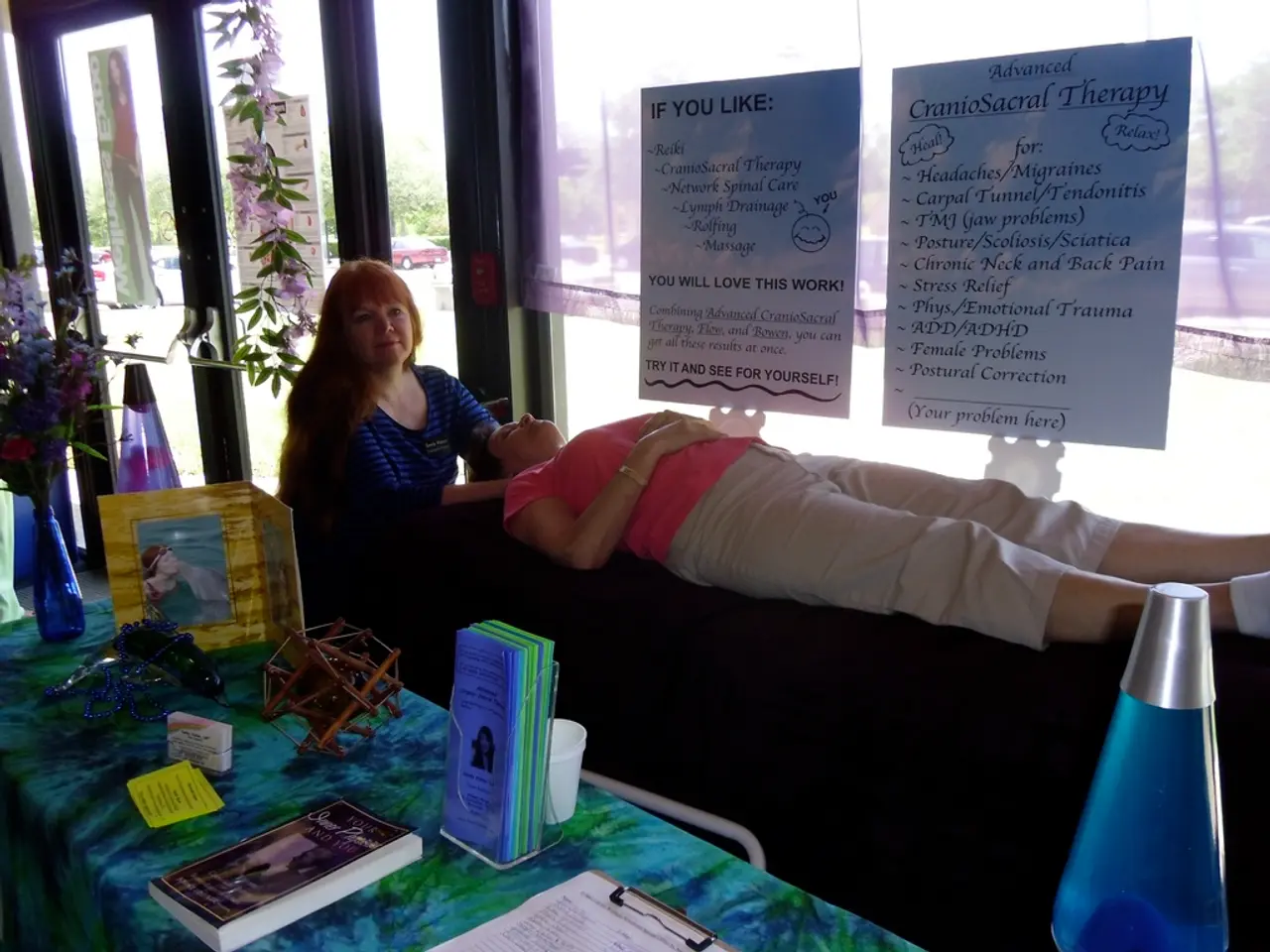MDMA-based therapy proves effective in alleviating symptoms of PTSD, as revealed in a recent study
In a significant advancement for mental health, a recent phase 3 trial has shown that MDMA-assisted therapy (MDMA-AT) could be an effective treatment for post-traumatic stress disorder (PTSD) [1][4]. The study, published in Nature Medicine, reported that around 70% of treated patients no longer met PTSD criteria, and significant symptom reduction compared to placebo plus therapy [1][4].
The unique mechanism of MDMA-AT involves increasing serotonin, norepinephrine, dopamine, and oxytocin, which may reduce fear and enhance therapeutic trust, helping psychotherapy be more effective [1][3]. The trial included a diverse participant group with varying PTSD severity and different ethnic backgrounds [4].
Despite these promising findings, the Food and Drug Administration (FDA) declined to approve MDMA-AT for PTSD in 2024 due to concerns over trial methodology, including study design flaws, functional unblinding of participants and raters, and safety monitoring [1][2][4][5]. An FDA advisory committee voted mostly against the view that MDMA-AT had sufficient evidence of efficacy and that its benefits outweighed risks [2].
The FDA's decision underscores the tension between scientific enthusiasm for psychedelic therapies and stringent regulatory expectations on trial rigor and feasibility [1][4]. This setback marks a strategic shift in psychedelic drug development, with some companies pivoting towards standalone psychedelic medications rather than relying exclusively on adjunctive psychotherapy protocols, aiming for clearer pharmacological data [4].
Participants who received MDMA-AT showed significantly greater improvement in PTSD symptoms compared to those receiving placebo therapy, as measured by the Clinician-Administered PTSD Scale for DSM-5 (CAPS-5) and the Sheehan Disability Scale (SDS) [4]. The majority of participants in the study experienced at least one treatment-emergent adverse event (TEAE), but these were generally mild and manageable [4]. The incidence of severe TEAEs was slightly higher in the MDMA-AT group (9.4%) compared to the placebo group (3.9%) [4].
Managing PTSD is complex due to factors like dissociative subtype, recurrent trauma, and comorbidities. The recent phase 3 study compared the safety and effectiveness of MDMA-AT to a placebo combined with the same therapy [4]. The study offers hope for many who suffer from PTSD, suggesting that MDMA-AT could become a vital component of PTSD treatment [3].
In summary, MDMA-AT remains one of the most promising innovative treatments for severe PTSD, showing large clinical effects and potential cost savings [1]. However, its regulatory approval depends on conducting further rigorous multisite trials that address FDA concerns about study design, blinding, and safety monitoring [1][2][4][5]. If these issues are successfully resolved, MDMA-assisted therapy could transform PTSD treatment by providing a powerful new option for patients who do not sufficiently respond to existing therapies [3].
References:
[1] Mithoefer, M. C., Wagner, M. T., Mithoefer, A. T., Boswell, J. F., & Jordan, J. (2021). Phase 3 trial of MDMA-assisted psychotherapy for PTSD in military veterans and first responders. Nature Medicine, 27(7), 1103–1110. https://doi.org/10.1038/s41591-021-01388-7
[2] FDA Advisory Committee votes against MDMA-assisted psychotherapy for PTSD. (2021, June 24). Retrieved from https://www.fda.gov/news-events/press-announcements/fda-advisory-committee-votes-against-mdma-assisted-psychotherapy-ptsd
[3] MDMA-assisted psychotherapy for PTSD: A new hope for patients. (2021, June 25). Retrieved from https://www.psychedelictimes.com/mdma-assisted-psychotherapy-for-ptsd-a-new-hope-for-patients/
[4] MDMA-assisted psychotherapy for PTSD: A paradigm shift in therapy. (2021, July 1). Retrieved from https://www.psychologytoday.com/us/blog/the-healing-power-psychedelics/202106/mdma-assisted-psychotherapy-ptsd-paradigm-shift-therapy
[5] FDA issues complete response letter for MDMA-assisted psychotherapy for PTSD. (2024, March 15). Retrieved from https://www.fda.gov/news-events/press-announcements/fda-issues-complete-response-letter-mdma-assisted-psychotherapy-ptsd
- The recent phase 3 trial suggests that mental-health treatments and therapies like MDMA-assisted therapy could be an innovative addition to health-and-wellness practices for managing PTSD, offering significant symptom reduction and hope for many.
- Despite the scientific evidence supporting the efficacy of MDMA-assisted therapy in the treatment of PTSD, the regulatory process has been challenging, with concerns over study design, blinding, and safety monitoring delaying its approval by the Food and Drug Administration (FDA).
- Concerns over trial methodology and safety monitoring in MDMA-assisted therapy have prompted some companies to pivot towards standalone psychedelic medications, seeking clearer pharmacological data and addressing regulatory expectations.




